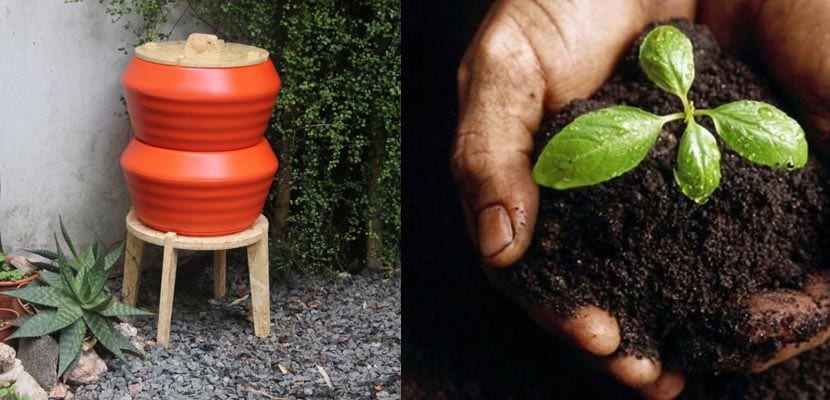
Those of us who do not live in the countryside, nor do we have land to cultivate, should not give up staying in touch with nature. Today the urban gardens allow us to grow vegetables on the balcony and urban composting to nurture these plants at the same time as reduce our waste.
What is compost? How is it produced?
Compost is a natural compost or organic fertilizer that is produced by the decomposition of organic remains and that can be used to improve the soil in your garden and feed your plants. The organic matter is attacked during the process by microorganisms (bacteria and fungi) causing its decomposition and fermentation and transforming the original matter into another with different characteristics.
To speed up fermentation, they are commonly used composting activators and worms are added in order to get vermicompost. More important than these activators, however, are the humidity and temperature conditions under which the process is completed. The temperature should range between 40 and 60ºC, while maintaining a certain humidity is essential. An excess of it, however, could cause the organic matter to rot and generate a bad smell.
The compost obtained must have a brown or blackish color similar to mulch, woodsy smell and being cold due to lack of microbial activity. You can achieve it in 3 or 4 months depending on what you use to make it and in what conditions you do it.
What organic waste can you take advantage of?
- From organic waste generated in your home, you can use ashes, coffee or tea grounds, infusions with included paper, eggshells, fruits, vegetables, newspapers not printed in color, expired yogurts, corks, kitchen paper, seasoning oil, hair, etc.
- And the garden? Leaves, grass, vegetables, shredded pruned branches, sawdust, etc.
Why produce your own compost?
Producing compost at home is a sustainable act from which matter returns to its starting point, the ground. Thus, a cycle is closed that also contributes to reducing the amount of garbage produced, greenhouse gas emissions and the use of petrochemical products. Do you need more reasons to produce your own compost? Do it for ...
- Reduce the amount of garbage produced in the home. The daily garbage generated in homes contains 40% organic matter, which can be recycled and returned to the earth to feed plants.
- Reduce greenhouse gas emissions. Home composting emits 5 times less greenhouse gases than industrial composting to treat the same amount of kitchen and garden waste.
- Download expense in fertilizers and chemical fertilizers by taking advantage of this material for the same purpose.
- Favor the nutrition of the land avoiding erosion and wear and tear typical of the use of petrochemical products.
Composting machines and urban vermicomposters
What is the difference between composting and vermicomposting? While a large number of microorganisms are involved in the first, only the earthworm Eisenía foetida, a laboratory hybrid capable of devouring a large amount of organic waste and turning it into vermicompost quickly. Speed that makes it the preferred option for those who have little time.
Composting machines
A composter is nothing but a vented container in which organic matter is deposited for decomposition. They can be made from numerous recycled materials or purchased in different designs and practical features.
First, a layer of medium-thick branches must be placed on them, which will allow the entry of air from below for the oxygenation of the mixture. It will then be filled with a mixture of green and dry material, which provides the ideal moisture, texture and nutrient conditions.
Vermicomposters
Vermicomposters convert the organic remains of your home or crop into high quality compost in an easy, fast, profitable and environmentally friendly way. They are generally composed of different trays: a worm humus collection tray with a tap in the lower area and several upper trays in which both the worms and the organic remains generated in the house are placed.
Today composter designs have been adapted to a more careful aesthetics, so that they do not clash on balconies or kitchens. Look at the design of the cover Compas compost bin, pretty, right? In addition, they have been provided with filters in order to avoid the bad odors that they can generate.
There is no excuse, therefore, for not composting beyond our lack of desire or commitment to the environment.



